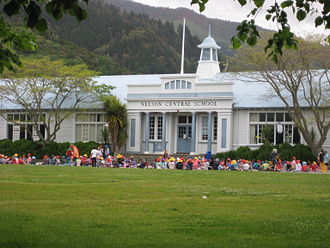
Knowing about the category of person who is self-employed with employees tells us a lot about the sort of person who has most of the power in New Zealand at the moment.
This sort of person has more power than anyone because they can legally cause more disruption than anyone. No politician cares too much if a single individual threatens to leave the electorate, but if an employer threatens to relocate their company with its 200 jobs then a politician will suddenly care very intently.
Surprisingly, there is no particularly strong difference between those who work for a wage or salary, those who are self-employed, and those who are self-employed with employees when it comes to median personal income.
These three groups have correlations of between 0.54 and 0.41 with median personal income, with the self-employed the strongest and the self-employed with employees the weakest.
However – as this section seeks to illuminate – holding political power is not merely a function of wealth, although wealth is a contributing factor.
There were very strong correlations between being of European descent and both being self-employed (0.58) and being self-employed with employees (0.70). This relates to the point made above about the power in an economy being held by a sort of person who was not necessarily the same as those who made the money.
Pacific Islanders were the least likely to be in either of those two categories. The correlation between being a Pacific Islander and being self-employed was -0.50, and with being self-employed with employees it was -0.61.
Being Maori was also negatively correlated with being in these categories of employment status: -0.44 with being self-employed and -0.36 with being self-employed with employees.
This reflects the fact that Islanders generally have less social capital than Maoris, despite often being better educated, and that Islanders generally have less financial capital than Asians, despite often having moved to New Zealand earlier and being more culturally established.
Anglicans comprise a large proportion of the power elite, as can be seen by the correlations between being Anglican and being self-employed (0.40) and being Anglican and being self-employed with employees (0.58).
This latter correlation is strong enough to tell us that Anglicans have a lot of political power in New Zealand through occupying essential positions in industry.
Other religious orientations with the strongest correlations with being self-employed with employees were Presbytarianism (0.45), having no religion (0.37) and Brethren (0.22).
These four groups: Anglicans, Presbytarians, those from no religious tradition and the Brethren, comprise the true power elite of New Zealand. The reason for this is because it is these people who own everything: generally they are directly descended from early settlers and owners of large farms.
Here it is possible to further illuminate the distinction within the highly-skilled occupations between the managers who run everything and the professionals they depend on to get things done.
Certain religious traditions had positive correlations with working for a wage or salary but negative correlations with being self-employed with employees.
Catholicism was the most notable of these. The correlation between being Catholic and working for a wage or salary was 0.30, with being self-employed it was -0.23 and with being self-employed with employees it was -0.31.
Other religious traditions which had positive or near neutral correlations with working for a wage or salary but negative correlations with being self-employed with employees were Buddhism (0.11 versus -0.24, respectively), Hinduism (-0.03 versus -0.44) and Islam (-0.03 versus -0.49).
Ultimately these statistics reflect how these latter traditions have higher proportions of recent immigrants who, despite often being highly educated and earning good money, have not had the time to establish themselves as part of the power elite. These immigrants often moved to New Zealand because their high skills were needed by the landowners and managers who were more established.
It’s also possible to observe the fault lines of a generational conflict between the Baby Boomers, whose education is patchy, and Generation X and the Millennials, who generally have modern educations but who are yet to dislodge the deeply entrenched Boomers.
The correlation between having a Master’s degree and working for a wage or salary was 0.33, and with being self-employed with employees it was actually negative, at -0.02. This latter correlation is incredible if one also considers that the correlation between having NZQA Level 1 (School Certificate) as one’s highest qualification and being self-employed with employees was 0.22.
Explaining much of this comes down to the fact that establishing oneself as a member of the power elite is more a function of age than of education.
The correlation between median age and being self-employed with employees was a strong 0.71, whereas with working for a wage or salary it was -0.37. This tells us that, over and above just about anything else, the power elite is old, and the people they hire to do their bidding are young.
To take a more granular perspective, the correlation between being aged 65+ and being self-employed with employees was 0.56, which is interesting if one considers that any person in this age bracket can also claim a pension of $350+ per week which is not means tested.
This is not just a function of greed, of course: realistically, many of the people running a company, especially if it’s one they own, cannot simply give up all of their responsibilities at one moment.
Generally they employ the under-50s. The correlation between being in the 20-29 age bracket and working for a wage or salary was 0.37, and between being in the 30-49 age bracket and working for a wage or salary was 0.52.
The power elite is also much more likely to be male than female. The correlation between being male and working for a wage or salary was 0.11, but the correlation between being male and being self-employed with employees was 0.50.
This isn’t simply a matter of male nepotism: the correlation between being male and doing unpaid work in the family business was 0.48. The truth is that it is in the nature of Kiwi men to work, and the vast majority of us would rather work than just sit around or have nothing to do.
The last point about the power elite that might not be well understood is the degree to which it is intergenerational, especially in the case of farming interests.
Some light can be shed on how strong this degree is by consideration of the correlation between working in agriculture, forestry and fishing and doing unpaid work in the family business, which was an extremely strong 0.90.
*
This article is an excerpt from Understanding New Zealand, by Dan McGlashan, published by VJM Publishing in the winter of 2017.



